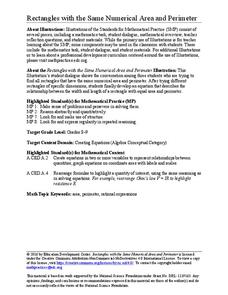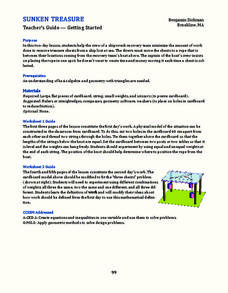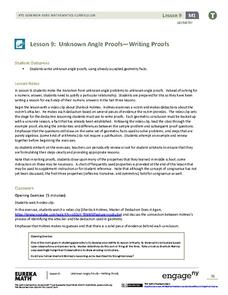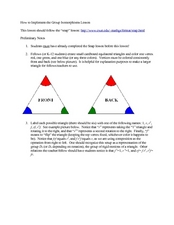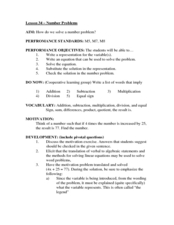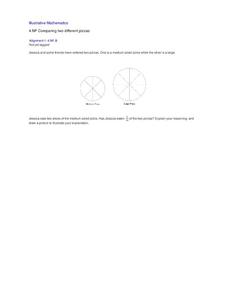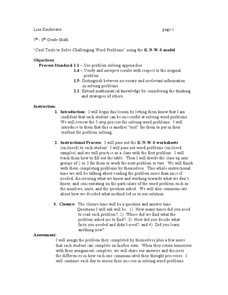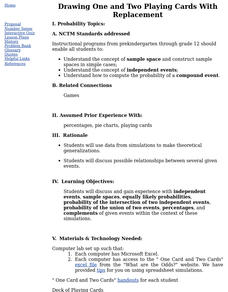Curated OER
Button Math
Use buttons, cards, and dice to perform simple math problems! This inventive lesson should be quite engaging for young learners. Kindergarteners use buttons to help them understand the concepts of greater than, less than, and equal to.
Curated OER
Two Squares are Equal
This problem is sure to get your young mathematicians thinking. The idea sounds simple: one equation, solve it as many ways as you can. This is meant to get at a deeper understanding of solving quadratic equations, including some more...
Curated OER
Equal Differences Over Equal Intervals 1
Learners explore linear functions concretely using tables of values in a cooperative task. The concept of the values of linear functions changing by equal differences over equal intervals of one is emphasized. Learners will discover...
Education Development Center
Interpreting Statistical Measures—Class Scores
Explore the effect of outliers through an analysis of mean, median, and standard deviation. Your classes examine and compare these measures for two groups. They must make sense of a group that has a higher mean but lower median compared...
Curated OER
Relations and Graphs
Here is a simple, yet clever lesson on how to teach the important concepts of greater than, less than, and equal to. Pupils write their names down on grid paper - one letter per box. They compare their names and find a name that is...
Education Development Center
Rectangles with the Same Numerical Area and Perimeter
Is it possible for a rectangle to have the same area and perimeter? If you disregard units, it happens! In a challenging task, groups work to determine the rectangles that meet these criterion. The hope is that learners will naturally...
Curated OER
Domain: Operations and Algebraic Thinking
Practice basic operations for young mathematicians in fun ways! Using two decks of cards (Ace through 10 plus the joker), learners play "memory" by matching numbers that can be added to make 10 and writing number sentences. In another...
Discovery Education
Architects in Action
Hands-on and real-world applications are great ways to teach mathematical concepts. Creative thinkers examine how ratios are used to create scale models of buildings and structures. They practice working with ratios by looking at a map...
Curated OER
Sunken Treasure
You've located buried treasure, now what? Explore how to use algebraic and geometric methods to determine where to place a recovery ship based on the location of the treasure.
EngageNY
Applying Tangents
What does geometry have to do with depression? It's an angle of course! Learners apply the tangent ratio to problem solving questions by finding missing lengths. Problems include angles of elevation and angles of depression. Pupils make...
EngageNY
Unknown Angle Proofs—Writing Proofs
What do Sherlock Holmes and geometry have in common? Why, it is a matter of deductive reasoning as the class learns how to justify each step of a problem. Pupils then present a known fact to ensure that their decision is correct.
Curated OER
Roman Bernardo: Solving Linear Equations
Mathematicians use an inquiry method to solve linear equations. In this linear equations lesson, students practice solving equations using addition, subtraction, multiplication and division. They solve multi-step equations and equations...
Curated OER
Group Isomorphisms
Students identify and apply properties of triangles. In this geometry lesson, students define equilateral triangles by sides and angles. They build cardboard triangles as they study properties of triangles.
Curated OER
A Mass of Pennies
Learners estimate and determine the number of cents (pennies) that are needed to equal the mass of a variety of common objects. They develop a process for measuring and explore concepts related to units of measurement.
NTTI
If You Hopped Like a Frog
Get your frogs hopping by introducing them to the concepts of ratio and proportion. As a class, they perform arithmetic operations using ratios then discover how they represent quantitative relationships. In groups, they write their own...
Illustrative Mathematics
Painting a Room
This real-life math problem concentrates on developing the understanding of dividing a unit fraction by a whole number. It allows students to draw out a solution to aid their thinking. The well-written answer sheet describes common...
Curated OER
Jon and Charlie's Run
Let's use math to solve an argument. Jon and Charlie are debating about who can run farther, but who is right? That's what your class will figure out as they apply their understanding of fractions to this real-life situation. A simple,...
Curated OER
Putting the Pieces Together
Children explore fractions on a conceptual level by making individual quilt squares. Each student works with small paper swatches to divide them into pieces that represent a given fraction. The class is then separated into groups and...
Curated OER
Number Problems
Students write equations for problems. In this number lesson, students add, subtract, multiply and divide numbers to solve for a variable. They rewrite word problems using algebraic symbols.
Illustrative Mathematics
Comparing Two Different Pizzas
What better way to learn about fractions than with a couple pizzas? Help Jessica figure out how much of the pizza she has eaten, while teaching your class that fractions refer to a specific whole amount. This problem will be challenging...
Curated OER
Cool Tools to Solve Challenging Word Problems
Students explore math functions by completing worksheets in class. For this word problem lesson, students read the story A Remainder of One and practice solving division problems from the story. Students complete a worksheet which...
Curated OER
Vector Lab
Here is a math lab that helps young mathematicians understand the real-life meaning for vector addition. By building a model using spring scales and washers as weight, and then calculating the vector addition using two different methods,...
Curated OER
Drawing One and Two Playing Cards With Replacement
Math whizzes use data from simulations to make theoretical generalizations and discuss possible relationships between several given events. They use a simple card game to generate data to be analyzed.
Virginia Department of Education
Matching Representations
Pupils explore the many representations of linear functions by completing a matching activity to connect the multiple representations of a function. They then reinforce the connection as individuals create the different representations...





